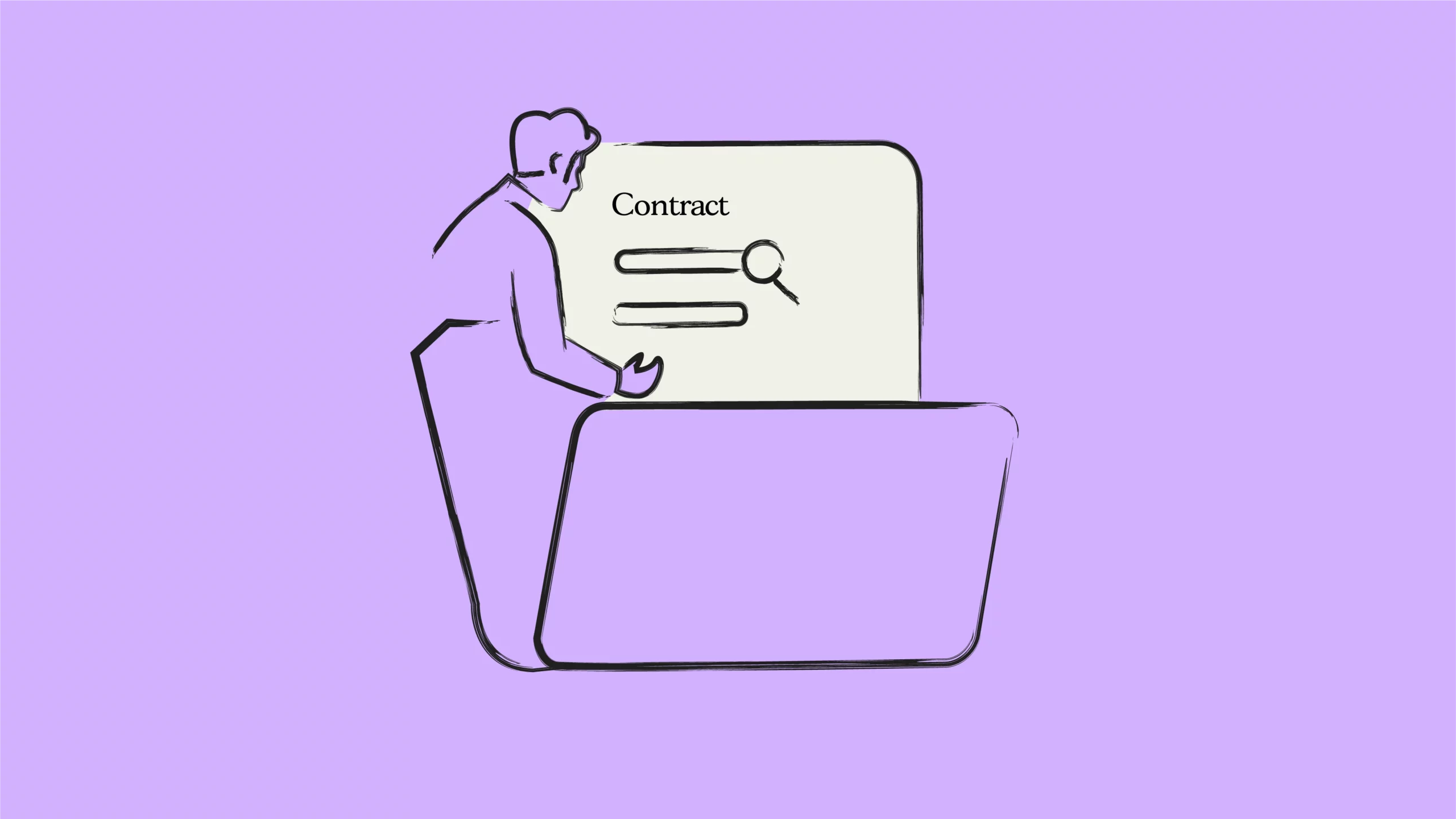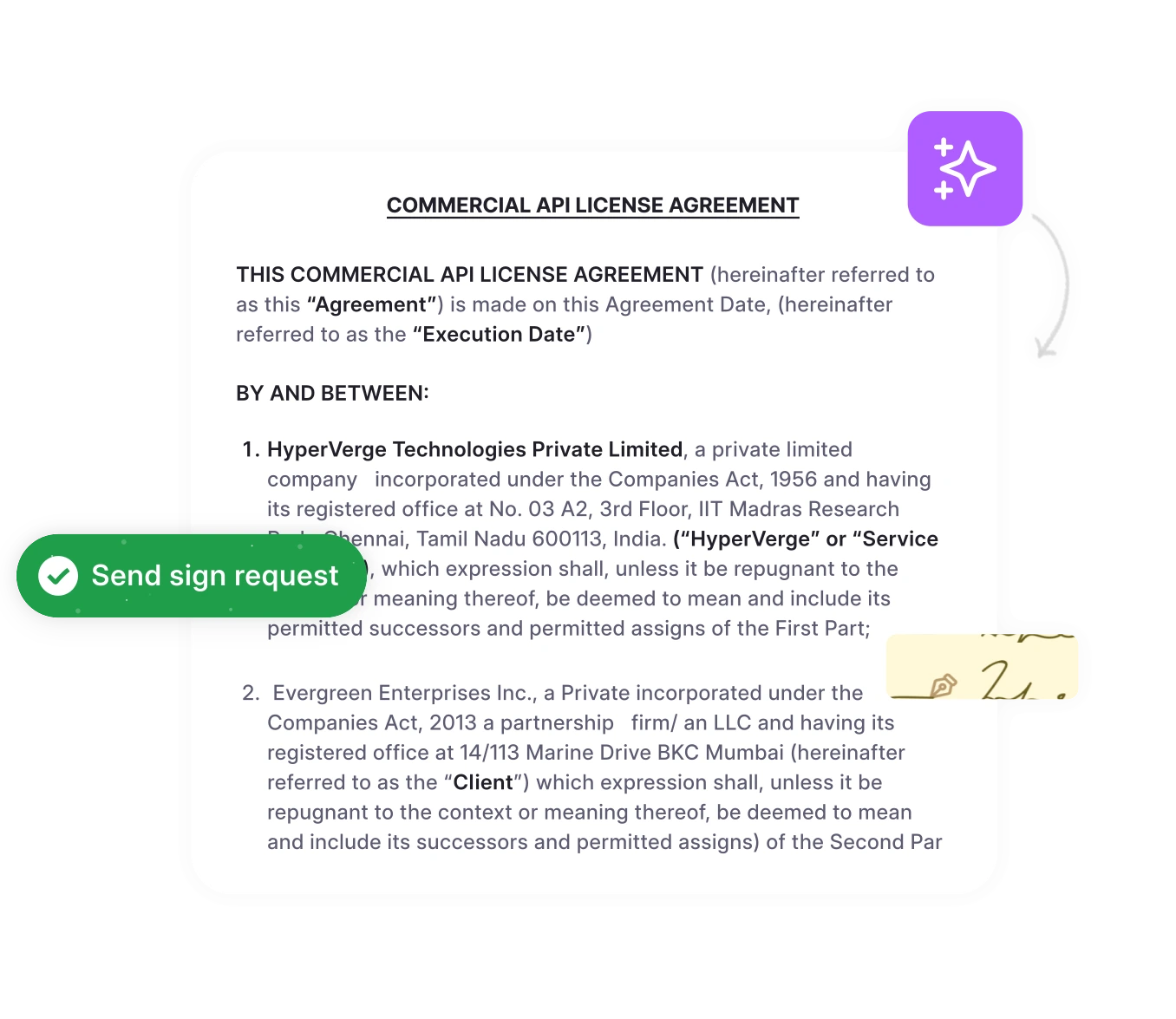Have you ever wondered what happens when contractual obligations are not met? In today’s competitive business landscape, understanding and managing these commitments is crucial for success. Contractual obligations are the commitments each party agrees to fulfill while signing a contract, encompassing tasks, payments, confidentiality agreements, and more.
Fulfilling these obligations is not just good practice; it’s required by law. Missing them can lead to significant legal repercussions and damage business relationships. Effective contract obligation management allows you to keep track of every commitment you’ve made and take proactive steps to fulfill them.
According to Gartner, implementing contract lifecycle management (CLM) software can reduce contract cycle times by up to 50%, lower administrative overhead by 25-30%, and improve compliance rates by 55%. This underscores the value of leveraging technology for streamlined obligation tracking and fulfillment.
Read this blog to learn how to manage your contractual obligations and avoid non-compliance with agreements. Get tips and best practices for fail-proof obligation management. Let’s start.
What is contract obligation management?
Contract obligation management refers to the systematic process of monitoring, tracking, and fulfilling the obligations outlined in contractual agreements. It is a crucial aspect of the broader contract lifecycle management process and focuses on ensuring that all parties adhere to the terms, deadlines, and commitments stipulated in the contract.
How obligation management integrates with contract lifecycle management?
Obligation management is not a standalone task; it is deeply integrated into the overall CLM framework. While the initial stages of CLM involve contract creation, negotiation, and signing, obligation management comes into play post-execution. It ensures that the contract’s terms are actively managed and enforced, bridging the gap between contract signing and actual performance. This process relies on tools like automated CLM software, which can trigger reminders, generate alerts, and provide dashboards to monitor obligation status.
Who manages contract obligations?
The responsibility for managing and tracking contract obligations often spans multiple roles, depending on the type and scope of the obligation:
Contract managers: Oversee all contract-related obligations, ensuring alignment with organizational goals.
Compliance officers: Focus on obligations related to regulatory and legal adherence.
Departmental heads: Monitor department-specific commitments, ensuring they are met on time and within budget.
Contractual obligations examples by departments
| Department | Obligation Examples |
| Sales | Collection of payments at the end of the quarter. Client account management with post-sales support when needed. |
| HR | Payment of employee compensation and benefits upon terms agreed in the contract. Adherence to employee work hours, safety regulations, and other labor laws. Taking steps to enforce an NDA, and enforcing confidentiality of sensitive company data. |
| Procurement | Delivery of goods within the timeline agreed in the contract. Monitor vendor adherence to industry standards and regulatory requirements. Ensure that the goods to be delivered meet the predefined quality benchmarks. |
| Legal | Uphold terms related to intellectual property rights and trademarks. Ensure that all organizational operations comply with local and international laws. |
| Finance | Monitor and approve organizational expenditures under contracts. Ensure timely payment of taxes and adherence to tax compliance. Ensure all payments of all contracts (vendor invoices, employee salaries, and taxes) are made on time. |
Obligation management helps ensure all departments in your organization stay on top of their commitments. However, there’s more to it. The coming section discusses the importance of contract obligation management.
Why is managing contractual obligations important?
Managing contract obligations helps ensure no commitment goes unfulfilled. There are many reasons as to why you should manage and track obligations. These are:
Improves relations with counterparties: Missing obligations results in soured partner relationships. Effectively managing obligations helps ensure satisfactory business terms with all contracting parties.
Helps avoid legal penalties and lawsuits: Certain obligations like confidentiality in a non-disclosure agreement are critical. Managing the obligations of such agreements helps improve compliance and avoid fines, penalties, and lawsuits.
Improves overall contract management: Managing contractual obligations helps streamline other parts of the contract lifecycle management process like tracking and compliance.
Avoids breach of contract and termination: Overdue obligations often result in breaches of contracts. Well-managed obligations help avoid contract breaches and dodge unwanted agreement terminations.
Stay On Top Of Contract Obligations
Manage and track all obligations automatically with HyperStart CLM. Gain better visibility on contracts and enhance compliance.
In retrospect, contractual obligation management significantly reduces business risks. However, managing obligations is challenging and presents considerable hurdles.
7 Common challenges in managing contractual obligations
Undoubtedly, managing obligations is important. However, tracking and managing obligations across dozens of contracts takes significant time and effort. Here are the key challenges in obligation and commitment management:
1. Time-consuming obligation tracking
Based on your organization’s size and scale, you may be dealing with dozens or even hundreds of contracts at a time. Tracking contracts for obligations and contract schedules can certainly be challenging in this case, especially when each contract differs in clauses, terms, and governing laws.
A construction company has numerous deadlines for completing project phases. Due to inefficient obligation tracking, a milestone is missed, causing project delays and triggering penalty fees in the contract.
2. Undefined responsibilities in obligations
With many departments sharing roles and responsibilities, there are chances of miscommunication. Shared responsibilities between teams like legal, procurement, and operations. In this instance, the accountability for obligations like milestones, deadlines, and compliance becomes blurred.
In a software development contract, the responsibility for providing necessary data for integration is not clearly defined. As a result, both parties assume the other is responsible, delaying the project and leading to a breach of contract.
3. Scattered contracts across different teams
Contracts can be stored in folders, files, computers, and even tools like CRMs, ERPs, finance management software, and HR management systems. This results in cross-functional teams losing the needed visibility in contracts. Consequently, contracts relevant to different departments are not tracked due to a lack of visibility.
A retail company has contracts with various suppliers managed by different departments. Without centralized access, the procurement team overlooks a contract renewal deadline, leading to supply chain disruptions and lost revenue.
4. Inconsistent contract formats and language
Unstandardized contract creation results in inconsistent agreements, often due to differences in formats and languages depending on the contract’s type and applicable legislation. Moreover, contract language and wording may vary depending on who drafted the agreement. As a result, legal teams have to spend more time understanding and managing agreements.
A manufacturing company enters multiple supplier contracts with different formats and terms. Due to inconsistent language, one contract includes penalties for late payments, while another does not. This confusion leads to unexpected fines and disputes when payments are delayed.
5. Lack of standardized templates
Without standardized contract templates, agreements often vary in format, structure, and language. This inconsistency complicates obligation tracking and increases the time required to review and manage contracts effectively.
Example: A global marketing agency uses different templates for client contracts across regions. When a dispute arises, the legal team struggles to resolve the issue because key clauses are worded differently in each template, delaying resolution and increasing legal costs.
6. Poor interdepartmental communication
Misaligned communication between departments can exacerbate tracking issues. When teams like legal, procurement, and operations don’t share updates or responsibilities effectively, critical obligations may be missed, leading to breaches or delays.
A healthcare company’s procurement team doesn’t inform the legal department of a supplier’s updated terms. This miscommunication leads to a missed payment deadline, triggering penalty fees and damaging the supplier relationship.
7. Adapting to changing regulations
Keeping up with evolving laws and regulations is a significant challenge. Ensuring that contract obligations comply with these changes requires continuous monitoring, which can be time-consuming and prone to error without proper systems in place.
A financial services firm fails to update its contracts to reflect new data privacy regulations. As a result, the firm inadvertently violates compliance requirements, leading to regulatory fines and reputational damage.
Manage Contracts 80% Faster
Choose HyperStart CLM—the AI-powered contract management tool to propel your contracting efficiency.
So far, you know the challenges in contract obligation management. What’s the solution? You can effectively manage obligations by following a few contract administration best practices specific to obligation management.
How to manage contractual obligations: 7 best practices
Here are 5 best practices that you can implement in your contract lifecycle management process for effective and flawless obligation management:
1. Auto-track obligations with CLM software
Contract lifecycle management tools offer functionalities to auto-track contract obligations.
You can set reminders for each obligation, so every obligation is tracked and acted on promptly.
With contract creation, review, approval, signing, storage, and tracking unified in one platform, it is easy to maintain obligations for all agreements.
HyperStart CLM’s obligation tracking solution tracks your obligations using AI, leaving nothing to chance.
2. Establish clear responsibilities for obligation tracking
Evaluate which team has the infrastructure and knowledge to handle specific obligations.
Business teams may manage obligations tied to operations, such as product or marketing observations.
Legal teams may handle obligations with regulatory reporting due to their expertise.
3. Use obligations as business opportunities
Legal teams can gain positive exposure and engage with the business more holistically.
Effective obligation management fosters long-term cooperation between legal and business teams.
It can transform stereotypical tensions into a mutually beneficial relationship.
4. Avoid auto-renewing contracts without renegotiating
Evergreen contracts are designed to auto-renew unless canceled.
Recurring agreements have a fixed window time for renegotiating the deal.
Missing the renegotiation period can leave companies stuck with unwanted services or products.
Tools like HyperStart CLM help generate renewal reminders to notify organizations of upcoming renewals, enabling them to plan renegotiations promptly.
5. Prioritize obligations based on risks
Identify and prioritize contract obligations according to the level of risk they pose to the business.
High-risk obligations, such as those with legal or financial consequences, should receive immediate attention.
Medium-risk obligations, like operational or partnership-related tasks, should be closely monitored.
Low-risk obligations can be managed with routine tracking, but should not be neglected.
6. Conduct regular audits
Make it a habit to audit your contracts and obligations periodically. This helps you catch compliance issues and resolve them before they become bigger problems.
Audits also reveal overlooked terms or inefficiencies that could be optimized for better results.
7. Leverage analytics to monitor performance
Use the analytics tools in your CLM platform to track how your contracts are performing.
These insights help you identify patterns, highlight areas for improvement, and make informed decisions to enhance your contract management process.
Implement these best practices to elevate your organization’s management of contractual obligations. You can also use contract management software like HyperStart CLM for automated and effortless obligation tracking.
Automate obligation tracking and management with HyperStart CLM
Tracking obligations across thousands of contracts scattered in folders, emails, and multiple software platforms can be a daunting task. Missed deadlines or overlooked commitments can lead to legal penalties, financial losses, and strained relationships. HyperStart CLM eliminates these challenges by automating obligation management, giving you complete visibility and control over your contract commitments.
Key features of HyperStart for obligation management
Centralized dashboard: HyperStart CLM consolidates all your contracts into one accessible platform. The centralized dashboard provides a clear overview of all obligations, including deadlines, compliance requirements, and renewal periods, ensuring nothing is overlooked.
AI-Powered obligation tracking: With advanced AI, HyperStart CLM automatically extracts key obligations from contracts and sets reminders. Whether it’s a regulatory compliance deadline, a payment milestone, or a renewal date, the system ensures timely notifications, helping you stay ahead of your commitments.
Seamless integration with existing tools Obligation management is more effective when integrated with tools like CRMs, ERPs, and project management software. HyperStart CLM connects seamlessly with your existing systems, enabling cross-departmental collaboration and ensuring obligations are tracked and fulfilled efficiently.
Get a demo of HyperStart CLM today.
Case Study: Qapita’s success in obligation management
Qapita, a digital equity management platform operating across Singapore, India, and Indonesia, faced significant challenges in managing contract obligations efficiently due to their growing contract volume and limited resources.
Challenges faced
Difficulty tracking critical obligations like renewals and compliance deadlines.
Fragmented contracts stored across different systems.
Inability to manage legacy contracts effectively due to resource constraints.
How HyperStart CLM helped Qapita
HyperStart CLM provided Qapita with a single repository for all contracts. The platform’s AI-powered search capabilities enabled them to retrieve contract data instantly.
Using AI-driven metadata extraction and automated renewal alerts, Qapita ensured no obligations were missed, staying proactive with deadlines and compliance.
Approval processes that previously took days were streamlined, significantly reducing turnaround times and improving cross-departmental collaboration.
Results achieved
With HyperStart CLM, Qapita transformed their contract operations:
Improved tracking of critical clauses, such as liability and indemnity.
Enhanced collaboration between finance, operations, and leadership teams.
Rapid platform adoption due to its intuitive interface and effective training.
Today, Qapita enjoys proactive obligation management, unparalleled visibility, and more efficient contract operations.
To know more about Qapita, read the detailed case study here.












